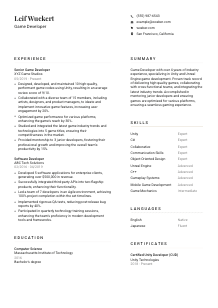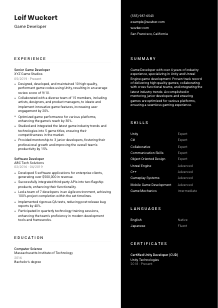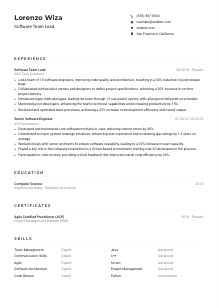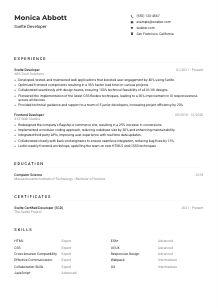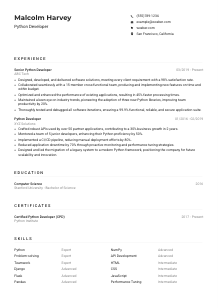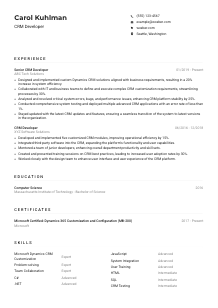Game Developer CV Example
Building virtual realms, but your CV feels like a glitch? Dive into this Game Developer CV example, rendered with Wozber free CV builder. Learn how to code your gaming genius to sync with job expectations, setting your career on a trajectory as epic as the quests you design!
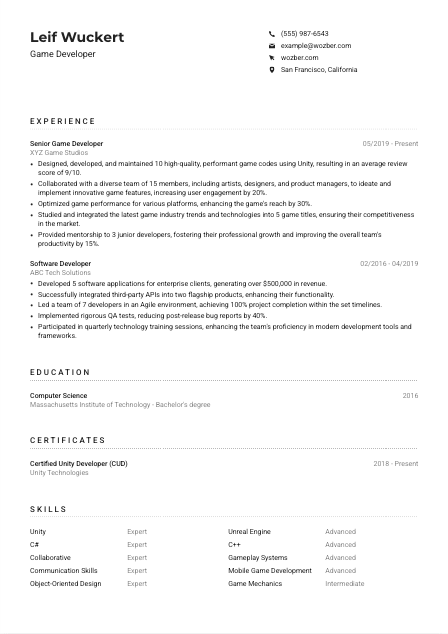
How to write a Game Developer CV?
Embarking on the quest to land your dream Game Developer role in the vibrant gaming industry? Your CV is your first level to beat - it's the game demo of your career, showcasing your skills and achievements to potential employers. With the help of Wozber's free CV builder, designed explicitly with ATS-compliance in mind, we're setting you up for success. This guide will walk you through creating a CV, not just aligned but optimised for your dream Game Developer position.
Ready to power up your career trajectory in game development? Let's press start on this adventure.
Personal Details
First impressions in game development, as in gaming, are crucial. The 'Personal Details' section of your CV is your loading screen - it should be quick, informative, and error-free. Follow these steps to ensure your intro captures the essence of a Game Developer ready for action.
1. Heroic Introduction
Just as every hero in a game has a name, make yours stand out. Keep the font clear, and consider strategic placement to ensure it catches the eye immediately.
2. Equip the Right Title
Under your name, proudly display your class - in this case, 'Game Developer'. It instantly communicates your specialization, mirroring the job title and making it clear you're in the right arena.
3. Establish Your Base
Communication is key in a team quest. List your contact details visibly - think of it as creating an easy checkpoint for potential collaborators to reach you. A professional email format like firstname.lastname@email.com maintains the quest's seriousness.
4. Map Your Locale
Mention your location prominently if it aligns with the job's requirement. Being based in 'San Francisco, California' scores you points for convenience and availability, as noted in our game plan.
5. Digital Footprint
If you have a professional profile or website showcasing your previous quests, include it. Make sure it's a mirror image of your CV to maintain consistency in your character's story.
Takeaway
Your 'Personal Details' set the stage for the narrative of your game development journey. They're quick facts but essential in pinpointing your location in the vast world of candidates. Keep them precise and aligned with the game's objectives. Now, let's proceed to the next level!





Experience
Your experience is your backstory, rich with quests you've undertaken and dragons you've slain (metaphorically speaking). It's here you show the realms you've explored and the impact you've made. Engage your reader with a compelling tale of your game development journey.
- Designed, developed, and maintained 10 high‑quality, performant game codes using Unity, resulting in an average review score of 9/10.
- Collaborated with a diverse team of 15 members, including artists, designers, and product managers, to ideate and implement innovative game features, increasing user engagement by 20%.
- Optimised game performance for various platforms, enhancing the game's reach by 30%.
- Studied and integrated the latest game industry trends and technologies into 5 game titles, ensuring their competitiveness in the market.
- Provided mentorship to 3 junior developers, fostering their professional growth and improving the overall team's productivity by 15%.
- Developed 5 software applications for enterprise clients, generating over $500,000 in revenue.
- Successfully integrated third‑party APIs into two flagship products, enhancing their functionality.
- Led a team of 7 developers in an Agile environment, achieving 100% project completion within the set timelines.
- Implemented rigorous QA tests, reducing post‑release bug reports by 40%.
- Participated in quarterly technology training sessions, enhancing the team's proficiency in modern development tools and frameworks.
1. Analyzing the Quest
Start by understanding the mission - in this case, the job description. Highlight experiences that directly address the call for 'proficiency in programming languages such as C# or C++' and your adventures with 'Unity or Unreal Engine'.
2. Organize Your Saga
Present your journey chronologically, with your latest epic (most recent job) leading. This is your story; ensure it's coherent and displays your progression in the game development world.
3. Quest Achievements
For each role, narrate not just your responsibilities but your triumphs. Did you 'design, develop, and maintain high-quality, performant game code'? Quantify it. Numbers translate to high scores in the eyes of hiring managers.
4. Power-ups
Quantify your achievements where possible. Saying you 'increased user engagement by 20%' showcases your direct impact and adds credibility to your claims. It's the loot that proves your worth.
5. Relevant Side Quests Only
While your journey might be full of side quests, focus on the ones relevant to our main mission. Aligning experiences with the job's needs shows you're on the right path.
Takeaway
Your 'Experience' section is where you've shown your valor and skill in previous battles, proving you're ready for this next challenge. Each point is an arrow in your quiver, aimed precisely at the target job's requirements. Forge ahead, fearless Game Developer!
Education
Every hero's journey starts with learning, and in the realm of game development, your education is that foundation. This section is where you showcase your spells and incantations (your degrees and coursework) learned in the mystical halls of academia.
1. Identifying Your Spells
First, put forth your most powerful spell - the required education. Our quest demanded a 'Bachelor's degree in Computer Science, Game Design, or a related field'. Ensure yours aligns with these ancient texts.
2. Spellbook Format
Keep your spellbook (your education section) organized. List your 'Bachelor's degree in Computer Science from Massachusetts Institute of Technology, 2016', in a clear, readable format.
3. Special Spells
Your specialization spells (relevant courses or projects) might not be directly asked for, but if they strengthen your case, mention them. This wasn't required in our quest, but it's a tactic to keep in your back pocket.
4. Extra Achievements
Scrolls of honor (academic honors), guilds (clubs), or special projects that align with the game development path add depth to your backstory. But remember, the higher your level, the more focused your history should be on actual field experience.
5. Continuous Learning
In a realm that's always evolving, show you're committed to learning new spells (keeping up with industry trends and technologies). This dedication keeps you competitive.
Takeaway
Your 'Education' section lays the groundwork of your capabilities, showing the starting point of your journey. It's where you gained the initial knowledge to embark on your quests. Now, armed with knowledge, it's time to highlight the tools in your arsenal.
Certificates
In the world of game development, certificates are like badges of honor - proof of your dedication to mastering the various disciplines of your craft. They're your extra power-ups, showing continuous growth in your skills.
1. Collecting Badges
Start by identifying the badges most revered in your quest. Although the game plan didn't call for specific certifications, showcasing a 'Certified Unity Developer' badge signals your commitment to excellence in the realm of Unity.
2. Displaying Your Badges
List the most relevant certifications up front. Prioritize quality over quantity, ensuring these badges of honor are easy to find and recognize.
3. Dates of Your Quests
If your badge has an expiration date, it's critical to mention when you acquired it. It shows you're keeping your powers current.
4. Never-ending Quest for Knowledge
The realm of game development is ever-changing. Regularly updating your badges and seeking out new ones keeps you ahead of the game.
Takeaway
Your certificates are your testimonials, celebrating the steps you've taken beyond the basic requirements to excel in your field. Display them proudly - they're a testament to your ongoing journey of improvement and mastery. Next, let's harness the power of your skills.
Skills
In a game developer's arsenal, skills are your weapons and tools - from the swords of C# and Unity to the armor of collaborative skills. Properly showcasing these in your CV ensures you're seen as a well-equipped warrior, ready for the development battleground.
1. Deciphering the Blueprint
Scour the job description for both explicit and implicit skill requirements. Noting skills like 'proficiency in programming languages such as C# or C++' directly links you to the job's needs.
2. Selecting Your Weapons
Match and list the skills that directly respond to the job's call. Highlighting your expertise in 'Unity' and 'C#' as well as 'communication skills' and 'team collaboration' proves you're not only technically proficient but also a team player.
3. Organizing Your Arsenal
While you might possess a vast array of skills, focus on the ones most relevant to our quest. This keeps your CV sharp and targeted, avoiding any unnecessary bulk.
Takeaway
Your 'Skills' section is a showcase of your professional toolkit, tailored perfectly to the mission ahead. It's a promise of the value you bring, displayed proudly. Next, we explore the power of communication in realms beyond our own.
Languages
In the vast, interconnected world of game development, languages are your access codes to different territories. Being multilingual can be a significant asset, unlocking doors in global markets and fostering better team dynamics.
1. Understanding Requirements
First, review the job posting for any language requirements. Our quest clearly states, 'Must have strong command of the English language', placing English at the top of our language list.
2. Cataloging Your Dialects
Start with the required language, listing your proficiency level. Adding 'Native' next to English offers immediate confirmation of your capability.
3. Additional Tongues
Listing other languages you're proficient in, like 'Japanese – Fluent', showcases your ability to navigate international waters, expanding your appeal.
4. Honesty is Key
Always provide an honest assessment of your language skills, using terms like 'native', 'fluent', 'intermediate', and 'basic' to describe your proficiency.
5. Understanding the Scope
For roles with a global perspective or those requiring interaction with diverse teams, being multilingual is a distinct advantage. It shows you're a player on the world stage.
Takeaway
Your proficiency in languages showcases your readiness to engage in multifaceted interactions within the game development community. It's your pass to wider collaborations and deeper understandings. Let's wrap up your journey with a compelling summary.
Summary
In the world of CVs, the summary is your game trailer - a brief glimpse into the adventures you've undertaken and the achievements you've unlocked. It sets the tone for the reader, enticing them to dive deeper into your story.
1. Capturing the Essence
Begin by absorbing the job description, allowing it to guide the narrative you craft here. It's your chance to highlight the missions you're most proud of, showcasing skills like 'specializing in Unity and Unreal Engine game development'.
2. Setting the Scene
Introduce the theme of your professional persona - think of it as choosing the setting for your game. Describe yourself as a 'Game Developer with over 4 years of industry experience', setting the stage for what follows.
3. Heroic Deeds
Detail a few key accomplishments and unique skills, making sure they resonate with the demands of the job. It's like selecting the highlights of your gameplay that best match the quest at hand.
4. The Cliffhanger
Keep your summary concise, intriguing, and to the point. It should beckon the reader to delve further into the game (your CV) to uncover the full story.
Takeaway
The summary is your opening scene - it makes a strong first impression and invites the hiring manager to learn more about you. Well-crafted, it weaves your qualifications and achievements into a narrative that aligns with the Game Developer role you're pursuing. You're now equipped to create a CV that resonates deeply with hiring managers. Arm yourself with Wozber's free CV builder, its ATS-friendly CV templates, and ATS CV scanner for optimisation. Your mission, should you choose to accept it, is to craft a CV that not only meets but exceeds expectations. Let the games begin, and may your career journey be as epic as the games you develop.
Your Game Development Career Quest Awaits
Congratulations, brave Game Developer, on completing this guide. With every section carefully tailored to the Game Developer position's demands, you're now ready to present a CV that not only matches but elevates your candidacy. Remember, your CV is the key to unlocking the next level in your career path. Utilize Wozber's free CV builder, make the most of its ATS-friendly CV format, and ensure your CV passes the ATS CV scanner with flying colors.
The realm of game development is vast and full of opportunities. As you embark on this journey, equipped with a CV crafted to perfection, remember that the greatest adventures lie ahead. Ready player one?

- Bachelor's degree in Computer Science, Game Design, or a related field.
- Minimum of 3 years of professional experience in game development, preferably with Unity or Unreal Engine.
- Proficiency in programming languages such as C# or C++ with a strong understanding of object-oriented design.
- Demonstrated expertise in gameplay systems, mechanics, and game features.
- Strong collaborative and communication skills to work effectively in a team-based environment.
- Must have strong command of the English language.
- Must be located in San Francisco, California.
- Design, develop, and maintain high-quality, performant game code.
- Collaborate with cross-functional teams including artists, designers, and product managers to define, ideate, and implement game features.
- Fix bugs and optimize game performance for different platforms and devices.
- Stay updated with the latest industry trends, techniques, and technologies to ensure the game remains competitive.
- Provide support and guidance to junior team members to foster their professional growth.





